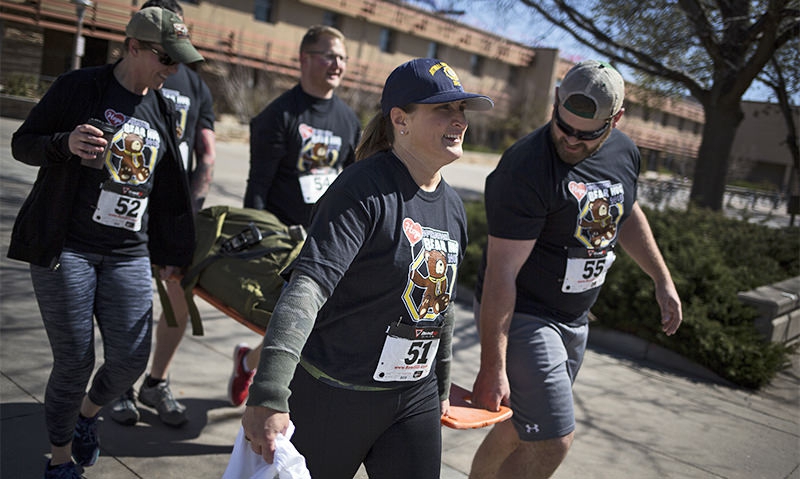
Operation Bear Hug at Colorado State University raises awareness and funds to battle suicide.
A beanbag toss, with the tosser blindfolded and relying on a teammate to tell him or her where to throw. A tractor tire flip, with the flippers not allowed to talk and relying on their teammates to see when they needed to take over in relief.
Those were just some of the obstacles teams faced in the Operation Bear Hug event Sunday at Colorado State University (CSU), each obstacle’s aim to raise awareness of suicide.
“This is the 10th leading cause of death in the country,” said Henry Seen, a member of American Legion Post 1879 in Fort Collins and the creator of the Operation Bear Hug obstacle course.
Seen was part of a panel formed to discuss suicide after two student veterans at CSU killed themselves in the fall of 2016.
“We realized that suicide happens because you get isolated. You start closing off your friends and families … we realized we need to do something different,” Seen said.
CSU’s Student Veterans Organization took on the obstacle course plan as a project and quickly realized the scope of the issue.
“How do we put an end to this? It’s a real plague,” said Post 1879 Adjutant Josh Hayes.
“In the summer of 2016 here in Fort Collins, we lost three 11-year-olds (to suicide),” Seen said. “We realized we needed to do something besides just the veteran community.”
There was also the question of why veterans were so susceptible to suicide when “we have these mandatory stand downs, everybody gets this training, and it’s still a problem,” Seen said.
Surveying veterans found three major takeaways from their time in the service: camaraderie, teamwork and purpose. That’s when Seen saw the obstacle course as a way to reflect those values.
“We needed something challenging to build their camaraderie, and we wanted it to be a teamwork thing,” Seen said. “The message of Operation Bear Hug is to identify someone who is struggling and you have to intervene. If they’re that far off the grid (that they’re considering suicide), they’re not going to find help themselves.”
A “pilot” version of the Operation Bear Hug obstacle course took place in April 2017, giving organizers the chance to work out the kinks for this year’s event.
Sunday’s second Operation Bear Hug event included a team of Legion family members — Department of Colorado Commander Terri Clinton, Hayes, Laura Feger and Joe Staver of Post 1879, and Scott Neff from Post 1864 in Parker.
Clinton made Operation Bear Hug her fundraising campaign for her term as department commander.
“His big thing is awareness, and for The American Legion, we’re out here today, we’re part of this community, we’re supporting the student veterans here, we’re raising awareness,” Clinton said. She noted that over 8,000 veterans commit suicide every year.
“One veteran suicide a year is not acceptable, and suicide is preventable,” Clinton said.
The five-person, multi-gender teams were not only raising awareness but competing for cash prizes — $250 for first place, $150 for second and $100 each for third through eighth-place. Over $7,000 in donations from the American Legion Riders, many of whom turned out Sunday, helped with that.
“It was such a success and we are grateful for those who came to support our cause,” said Alexandria Knappe, president of Operation Bear Hug.
And Seen and other organizers want to see the cause spread nationwide.
“What we hope to see is this picked up by other universities,” he said. “We want to have this conversation on a national stage. …
“It takes intervention. It takes somebody outside of that individual (contemplating suicide) to make that contact. You can’t wait for the person who’s struggling to make the call for help, because they won’t.”
- Suicide Prevention

